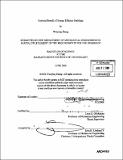Cost and benefit of energy efficient buildings
Author(s)
Zhang, Wenying, S.B. Massachusetts Institute of Technology
DownloadFull printable version (2.062Mb)
Other Contributors
Massachusetts Institute of Technology. Dept. of Mechanical Engineering.
Advisor
Leon R. Glicksman.
Terms of use
Metadata
Show full item recordAbstract
A common misconception among developers and policy-makers is that "sustainable buildings" may not be financially justified. However, this report strives to show that building green is cost-effective and does make financial sense today. Though green buildings typically have a higher upfront cost compared to conventional constructions, they do offer benefits that simply built-to-code projects lack. These benefits include cost savings from reduced energy and water use, less waste production, diminished environmental and emissions costs, lower operations and maintenance costs, and enhanced occupant productivity and health. These values range from being fairly predictable (energy and water savings can be recorded over time) to relatively uncertain (productivity/health benefits are somewhat arbitrary and subjective). Based on a 20-year Net Present Value analysis with a 5% real interest rate, a recent study by the California Sustainable Energy Task Force showed the total financial benefits of green design to be $50/ft2 - $75/ft2, depending on the building's level of LEED Certification. This number is over ten times bigger than the average 2% cost premium calculated for the 33 green buildings they analyzed-about $3-5/ft in California. (cont.) Energy savings alone, from reduced energy demand and decreased peak load, was calculated to be $5.79, which already exceeds the cost premium. Conservative calculations based on a study on Norway building retrofits show that the cost of energy savings ranges from 1-4 cents/kWh. Comparing this number to the cost of various modes of electricity generation, ranging from 3-80 cents/kWh, it is clear that the cost of generating electricity greatly exceeds the cost of saving energy through energy efficient buildings. Thus, green buildings are cost effective and should be more widely adopted.
Description
Thesis (S.B.)--Massachusetts Institute of Technology, Dept. of Mechanical Engineering, 2006. Includes bibliographical references.
Date issued
2006Department
Massachusetts Institute of Technology. Department of Mechanical EngineeringPublisher
Massachusetts Institute of Technology
Keywords
Mechanical Engineering.